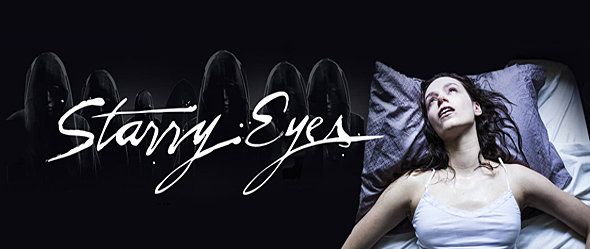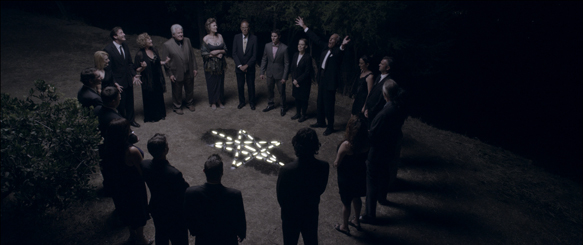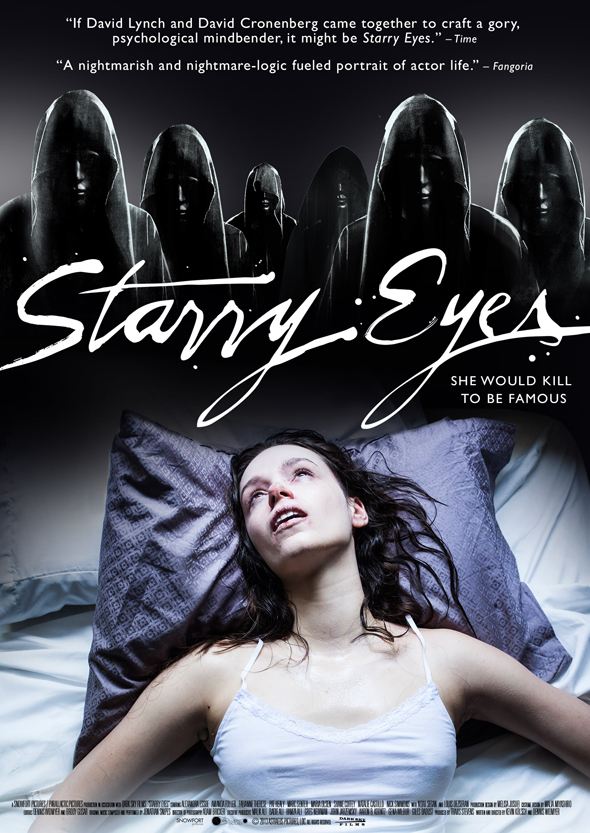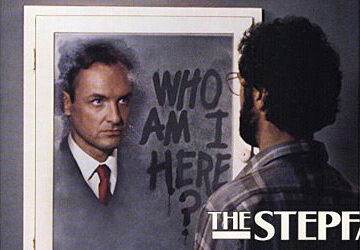It is difficult to discuss Starry Eyes, written and directed by Kevin Kolsch and Dennis Widmyer, without bringing up the names of Darren Aronofsky and David Lynch. Each has addressed similar subject matter to that presented in Starry Eyes in their respective films Black Swan (2010) and Mulholland Drive (2001). All three films feature hopeful ingenues who face extreme challenges in their quests for the “big break.” While Aronofsky and Lynch take a more literary, experimental approach, Kolsch and Widmyer eschew subtle symbolism in favor of in-your-face Horror that appears to be intended as literal, although the metaphorical subtext is abundantly clear. In a way, it is refreshing to see a film that challenges the unscrupulous nature of the show business industry, highlighting the damage it does to fragile young hopefuls, without taking itself too seriously. Perhaps since the film’s creators are relatively new on the scene, the topic is less personal for them, allowing room for more frivolity and less navel-gazing.
- Still from Starry Eyes
Starry Eyes is about Sarah (Alexandra Essoe), a beautiful young actress who is struggling to find roles. Between auditions, she waitresses at Big Taters and hangs out with her roommate, Tracy (Amanda Fuller of Cheap Thrills 2013 and Red White & Blue), and their friends, who are also involved in the film industry. Sarah’s issues are prominently put on display from the very start of the film when she eyes herself in the mirror critically, pulling at the flesh covering her gaunt frame as if concerned that she has gained weight. She is clearly unhappy with her waitressing gig, and her “friends” regularly make snide remarks about her inability to snag a role. In contrast to her peers, Sarah is quiet and reserved, but she is confident in her skill as an actress. The question that this film asks, along with others of its ilk, is how far will she be willing to go for fame?
Sarah auditions for a film called The Silver Scream, and the unnamed casting director played by Maria Olsen (Paranormal Activity 3 2011, The Lords of Salem 2012) and her also unnamed assistant played by Marc Senter (Red White & Blue 2010, Cabin Fever 2: Spring Fever 2009) are utterly unimpressed with her reading. Sarah retreats to the bathroom where, once in a stall, she throws a violent hair-pulling tantrum. The casting director overhears her, and calls her back into the audition room where she asks Sarah to reenact her “fit.” Sarah hesitates at first, but when she realizes this is her last chance to make an impression on her grim-faced judges, she obliges. The casting director dismisses Sarah with a noncommittal, “We’ll be in touch.”
- Still from Starry Eyes
Although at this point it seems that there is not much hope that Sarah will get a call back, she does, and the filmmakers devise a series of “challenges” for Sarah to complete in order to prove her commitment to the project. Predictably, some of these involve Sarah stripping down or quietly enduring the producer’s (Louis Dezseran) sexual appetites, but there is obviously something even more unsavory at work than garden-variety Hollywood corruption. The influence of this evil results in a sharp change in tone and style: Horror that initially presents as eerie visions, dreams, and suggestions later transitions into straightforward, old-fashioned splatter and gore.
As she becomes more involved with the film, Sarah begins to behave erratically. Her health and body also begin to deteriorate quite drastically, and the lurid, stomach-turning imagery associated with this change resembles that of the 2013 Body-Horror gore-fest Contracted. One incredibly frustrating element of the film is that neither Sarah’s roommate nor her friends suggest she seek medical help even though she appears to be at death’s door, but they are characterized from the start as being uncaring and not-too-bright, so perhaps their inaction is appropriate. It is unlikely that any medical professionals would have the means to treat Sarah’s “condition” anyway.
- Still from Starry Eyes
That the film industry is sometimes corrupt is no secret, and as mentioned earlier, this concept has been addressed in a number of films spanning a variety of genres. Starry Eyes, however, provides some levity to the subject, injecting a substantial amount of humor both intentional and, as a result of the over-the-top gore, accidental. This is a Horror movie for Horror fans. There is an obvious underlying message, but it is likely not enough to satisfy those who consider Horror to be “low art.” For the rest of us, though, Starry Eyes is a fun exploration of the question of “How Far” and what might happen if the answer is “All The Way.” CrypticRock gives Starry Eyes 3.5 out of 5 stars.
- Snowfort Pictures









No comment